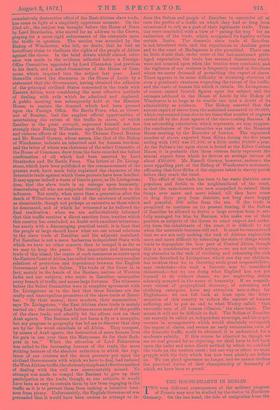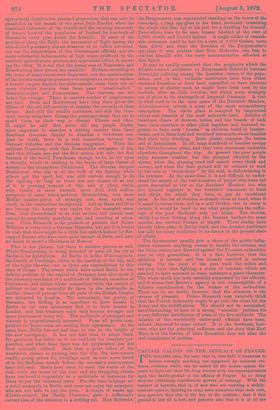THE HOUSE-DEARTH IN BERLIN.
TWO very different consequences of the military progress of Prussia may now be studied by the visitor to Northern Germany. On the one hand, the tide of emigration from the agricultural districts has assumed proportions that can only be paralleled in the annals of the great Irish Exodus, when the combined influences of the famine and the existing insecurity of tenure hurried the population of Ireland by hundreds of thousands every year across the Atlantic. In some of the provinces along the Baltic the movement of flight among the able-bodied peasantry almost deserves to be called universal, nor can the exhortations of the Government officials, nor the more substantial inducements of high wages proffered by the resident agriculturists, produce any appreciable effect in arrest- ing the efflux. It is not that the young men of Pomerania and Brandenburg have grown less patriotic. Neither, according to the craze of some overheated disputants, can the machinations of theJesuits urging the peasantry to emigrate in order to weaken a heretic empire explain the phenomenon, since there are no more sialwart heretics than these same "broad-backed " Brandenburgers and Pomeranians. The harvests are not below the average. There is scarcity neither of employment nor food. Stein and Hardenberg have long since given the tillers of the soil full security of reaping the rewards of their labour. And still the exodus continues, and still the blue- eyed, tawny emigrants throng the passenger-ships that are to speed them on their way to distant Illinois and Ohio. It might be said that never did any people display more eagerness to abandon a sinking country than these Northern Germans display to abandon a victorious one. And in truth, there is a real connection between the German victories and the German emigration. When the militant Dupanloup, with that Bossuet-like arrogance of hie, said that Prussia was not the first nation, but only the first barrack of the world, Frenchman though he be, he hit upon a thought which is working in the brains of large classes of society in the triumphant Fatherland. The German Jacques Bonhomme, who has to do the bulk of the fighting while others get the spoil, but was still content enough to do the fighting so long as there was any chance of an end of it, is growing wearied of this sort of glory, which only results in more barrack, more drill, with endless prospects of more blood-and-iron Bismarckism, and more Moltke master-pieces of strategy, east, west, north, and south, in the comfortless background. And so Hans and Fritz are leaving the hungry war eagles for the spangled stars. Dear, dear Deutschland is as dear as ever, but mortal man cannot be perpetually marching past and standing at atten- tion. Prinz Bismarck is the greatest of patriots and Kaiser Wilhelm is every inch a German Emperor, but yet it is lawful to wish that there might be a little less spiked-helmet for flat- capped Bauern who have seen quite enough of Paris, and have no desire to spend a Christmas at Moscow.
This is one picture, but there is another picture as well. While Brandenburg is being denuded of men, all the cry at Berlin is for habitations. At Berlin it is the Tf'ohnungsnoth, the Dearth of Dwellings, which is the question of the day, and of the night likewise ; nor is there any contradiction in this state of things. The events which have raised Berlin to the definite position of the capital of Germany have also made it the necessary residence of a multitude of officials, members of Parliament, and others whose connections with the centres of political action as naturally fix them in the metropolis as similar classes of persons from all parts of the British Empire are attracted to London. The aristocracy, the gentry, of Germany, are finding it as expedient to have houses in Berlin as our own aristocracy find it to have houses in London, and this tendency must only become stronger and more pronounced every day. The multitude of strangers and visitors is proportionately increased. From all points com- petitors for house-room are making their appearance. At the same time, Berlin has not had time to rise to the height of the new emergency. It has not had time to adapt itself. Its greatness has fallen on it too suddenly for complete pre- paration, and what time there was for preparation has not been seriously utilised. Now that a great influx of the wealthiest classes is pouring into the city, the new-comers readily giving prices for dwellings such as were never heard of in the Berlinese annals before, the necessary consequences have followed. Rents have risen to meet the wants of the rich, while the wants of the poor and the struggling classes have rendered it impossible in a multitude of instances for them to pay the enhanced rents. For the time lodgings are a strict monopoly in Berlin, and none can enjoy the monopoly who are not able to pay the price. A couple of weeks ago Sladderadatsch, the Berlin Charivari, gave a sufficiently correct idea of the situation in a striking cat. Herr Hobrecht, the Burgomaster, was represented standing on the tower of the town-hall, a long spy-glass in his hand, anxiously examining the whole city that lay at his feet for a dwelling for himself. Everywhere were to be seen houses labelled at the rent of 5,000, 6,000, and 10,000 thalers. A single edifice of remark- able meanness could be had for a rent of 2,000 thalers, more than £300, and from the direction of the Burgomaster's spy-glass it was evident that Herr Hobrecht was fain to content himself with the sorry accommodation afforded at that figure. It may be readily conceived that the perplexity which the Rladderadatsch attributes to Burgomaster Hobrecht becomes downright suffering among the humbler classes of the popu- lation, and, in fact, veritable multitudes have been either rendered homeless, or have been compelled to have recourse to means of shelter such as might have been seen by the roadside after an Irish eviction, but which seem strangely out of place in the metropolis of Imperial Germany. A visit to what used to be the open space of the Butchers' Meadow, Schlcechterwiese, reveals a scene of the most extraordinary description. The whole place is occupied by improvised cabins and shanties of the most miserable kind. Articles of furniture, chests of drawers, tables, and the boards of beds have been somehow or other piled together and fastened to- gether to form such " houses " as children build in lumber- rooms, and in these frail and wretched tenements whole families find their only dwelling. Rude planks compose the better sort of habitations. In all, some hundreds of families occupy the Schlcechterwiese alone, and they have numerous imitators elsewhere throughout the city. At present the poor people enjoy summer weather, but the prospect afforded by the winter, when the piercing wind will search every chink and cranny, and when the bare ground will be reduced to mud by the rain or "burnt-froze" by the cold, is disheartening in the extreme. At the same time, it is not difficult to under- stand the misery of the vast numbers of people who have not quite descended so low as the Butchers' Meadow, but who live heaped together in the wretched tenements in lanes and alleys, for which they have to pay an exorbitant price. As the 1st of October is already close at hand, when it is usual to revise rents, and as a still further rise in rents is certain, it would be hard to say what proportions the suffer- ings of the poor Berlinese may yet attain. The cholera, which has been flitting along the Russian borders for some months, has entered Prussia at length. Three deaths have already taken place in Berlin itself, and the dreaded pestilence has only too many conditions in its favour in the present state of affairs.
The Government usually gets a share of the public indig- nation whenever anything occurs to trouble the citizens, and the bitter outcry now directed against the Prussian authorities may be very groundless. It is a fact, however, that the agitation is intense, and has already resulted in serious rioting. For the most of the past week the police and the poor have been fighting a series of combats which are asserted to have assumed in some instances a grave character. The whole truth has been carefully suppressed by the officials, and it seems that Reuter's agency is not unsusceptible of a delicate consideration for the wishes of the authorities. There can be no doubt, however, that the situation is the reverse of pleasant. Prince Bismarck may naturally think that the French indemnity ought to go into the chest for the Army and the fortifications. We should not be astonished, notwithstanding, to hear of a strong " socialist " petition for a very different distribution of some of the five milliards. The salaries of the wretchedly under-paid officials have been, indeed, improved to some extent. It is the workmen, how- ever, who are the principal sufferers, and the story that Karl Marx is at the bottom of their discontent does not alter the real complexion of matters.



































 Previous page
Previous page